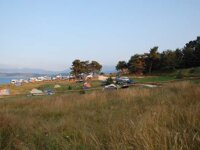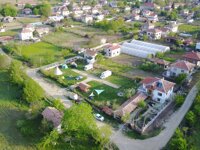Camping in Bulgaria
2 campsites in Bulgaria
Campsite Listing Google Map
The following consent is required:
Tracking & performance, Targeting & advertising.
Bulgaria
If you're looking for an affordable and exciting way to explore Bulgaria, a caravan or motorhome holiday might be just the thing for you. Bulgaria is the perfect destination for your next adventure, with stunning scenery, delicious food, and a wealth of cultural attractions to discover.
Whether you're travelling alone, with family or friends, a caravan holiday offers the freedom and flexibility to explore at your own pace and experience all this fascinating country has to offer. From the sunny beaches of the Black Sea coast to the snow-capped peaks of the Balkan Mountains, there's something for everyone on a caravan holiday in Bulgaria.
The capital city, Sofia, is a popular tourist destination with a rich history and culture. With a mix of ancient and modern architecture, the city offers visitors a unique experience with its many museums, galleries, and cultural attractions.
Visitors can explore the ancient Roman ruins of Serdica, the stunning St. Alexander Nevsky Cathedral, or stroll through the beautiful Vitosha Mountain National Park, just outside the city.
Foodies will love Sofia's vibrant food scene, with traditional Bulgarian dishes like banitsa (a pastry with cheese), kyufte (meatballs), and tarator (a cold soup) on offer.
About Bulgaria
Basic information

Capital Sofia
Currency Lev (BGN) *
Language(s) Bulgarian
Time Zones EET (UTC+2)
Summer (DST) EEST (UTC +3)
Telephone Code +359
Units Metric
EU Member Yes
Schengen Area No **
Tourism Websitevisitmybulgaria.com
Bulgaria is a member of the European Union, and customs inspections are occasionally conducted on individuals and vehicles crossing the border to ensure compliance with Bulgarian regulations.
* A target date has been set for Euro adoption on January 1st 2025.
** Bulgaria is currently in the process of joining the Schengen area.
Shopping in Bulgaria

Shopping in Bulgaria can vary depending on the city and location. In larger cities such as Sofia and Plovdiv, you'll find a mix of shopping malls, department stores, and street markets that are open throughout the week. These shopping centres typically operate from 10 a.m. to 9 p.m. or 10 p.m., seven days a week. Shopping enthusiasts will find plenty of options in Sofia's many markets and malls, including the famous Vitosha Boulevard.
Shops may have shorter operating hours in smaller towns or villages, particularly on weekends. It's common for shops to be closed on Sundays, although some may open for a few hours in the morning. It's also worth noting that during national holidays, shops and other businesses may have different operating hours or be closed altogether.
Overall, shopping in Bulgaria can be a fun and unique experience, with a mix of modern shopping centres and traditional markets selling everything from local crafts to fresh produce. It's best to check the specific operating hours of the shops you plan to visit to avoid any unexpected closures or limited hours of operation.
Bulgarian Money

As a tourist in Bulgaria, it is relatively easy to obtain the local currency, the Bulgarian Lev (BGN). A target date has been set for Euro adoption on 1 January 2025. Most major cities and tourist areas have banks, ATMs, and exchange bureaus that offer currency exchange services. ATMs are widely available in most cities and towns, and they typically accept major credit and debit cards, such as Visa, Mastercard, and Maestro.
When exchanging money, paying attention to the exchange rates and any fees that may be charged is essential. Some exchange bureaus may offer more favourable rates than others, so it's worth shopping around to find the best deal. It's also advisable to carry a mix of cash and cards, as some smaller shops and restaurants may not accept cards, particularly in more rural areas.
Overall, obtaining local currency in Bulgaria is relatively straightforward, and most major payment methods are widely accepted. It's always a good idea to inform your bank or credit card company of your travel plans to avoid any issues with card usage while abroad.
Public Holidays in Bulgaria
There are several public holidays throughout the year:
- New Year's Day - January 1st
- Liberation Day - March 3rd
- Orthodox Easter - a moveable holiday (usually in April or May)
- Labour Day - May 1st
- Saints Cyril and Methodius Day - May 24th
- Unification Day - September 6th
- Independence Day - September 22nd
- National Day of the Bulgarian Revival Leaders - November 1st
- Christmas Day - December 25th
Please note Some dates are moveable, so please check before travelling.
Driving in Bulgaria

There are specific driving regulations that visitors need to be aware of when driving in Bulgaria. Here are some of the key regulations to keep in mind:
- Driving permit: To drive in Bulgaria as a foreigner, you must have a valid international driving permit or a Bulgarian driving license.
- Road rules: Bulgarian traffic laws follow the right-hand side of the road. The use of seat belts is mandatory for all occupants of a vehicle. Using mobile phones while driving is prohibited unless you have a hands-free device.
- Speed limits: The speed limits in Bulgaria are generally as follows: 50 km/h in residential areas, 90 km/h on regional roads, and 120 km/h on highways.
- Alcohol limit: The legal blood alcohol limit in Bulgaria is 0.5 mg/ml. Driving under the influence of alcohol can result in a fine, suspension of driving privileges, or imprisonment.
- Road tolls: Some roads and highways in Bulgaria have tolls, and you must pay to use them. Payment can be made at toll booths or online.
- Winter tires: From November 15 to March 1, all vehicles must have winter tires or snow chains when driving on certain roads.
It's important to note that driving in Bulgaria can be challenging, particularly in cities and rural areas, due to narrow streets, aggressive drivers, and poor road conditions. It's advisable to exercise caution, follow traffic laws, and be mindful of other drivers on the road.
Bulgarian Emergency Services
- Call 112 for the police, ambulance and fire and rescue.
- Ambulance150
- Fire Brigade 160
- Police 166
- BULSAR (Bulgarian Black Sea Search & Rescue) 088 161
- Medical Emergency Service 116
Bulgaria's Climate
Bulgaria has a diverse climate due to its varied topography and location on the Balkan Peninsula. The country experiences four distinct seasons, with hot summers and cold winters.
In the summer months (June to August), temperatures can reach 30°C (86°F) or higher, particularly in the lowlands and coastal areas. However, in mountainous regions, temperatures can be cooler, and the air is generally fresher and less humid.
In the winter (December to February), temperatures can drop below freezing, particularly in the mountains, where snowfall is expected. In the lowlands, temperatures are milder, but occasional snowfall may still occur.
The shoulder seasons of spring (March to May) and autumn (September to November) are generally mild and pleasant, with cooler temperatures and occasional rainfall.
Bulgaria's climate is characterized by warm summers, cold winters, and distinct seasonal changes. Visitors to Bulgaria should check the weather forecast and pack accordingly, particularly if visiting in the summer or winter months.

